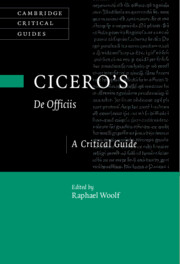Book contents
- Cicero’s De Officiis
- Cambridge Critical Guides
- Cicero’s De Officiis
- Copyright page
- Contents
- Contributors
- Acknowledgements
- Abbreviations
- Introduction
- Part I The Framework of De Officiis
- Part II The Role of Virtue
- Part III Exemplary Ethics
- Part IV Self and Society
- 8 Care of the (Written) Self
- 9 Cicero and the Cynics
- Part V Politics
- References
- Index
- Cambridge Critical Guides
9 - Cicero and the Cynics
from Part IV - Self and Society
Published online by Cambridge University Press: 15 June 2023
- Cicero’s De Officiis
- Cambridge Critical Guides
- Cicero’s De Officiis
- Copyright page
- Contents
- Contributors
- Acknowledgements
- Abbreviations
- Introduction
- Part I The Framework of De Officiis
- Part II The Role of Virtue
- Part III Exemplary Ethics
- Part IV Self and Society
- 8 Care of the (Written) Self
- 9 Cicero and the Cynics
- Part V Politics
- References
- Index
- Cambridge Critical Guides
Summary
In his discussion of decorum Cicero supposes that most people would agree to the general principle that in our speech, bodily deportment, and actions we should avoid giving offence to others. This is because we possess a sense of shame or verecundia. The particular details are very culture-specific: customs and conventions largely set the parameters of verecundia, and we do well to follow them. Cicero also admits that philosophical figures often flaunt established customs and conventions: he points to Socrates, who is justified in doing so owing to his great and godlike virtue, and the Cynics, who are not justified in doing so at all (1.148). He then sets out a bold thesis: ‘Indeed the reasoning of the Cynics must be rejected absolutely; for it is inimical to a sense of shame (verecundia), without which nothing can be upright (rectum), nothing honourable (honestum)’. For the Cynics, verecundia is not natural; hence we are justified in flaunting customs and conventions. Cicero develops a counter-argument against the Cynics: the source of shame or verecundia is indeed natural. I explore his argument for this thesis (which appears at 1.126ff.) and assess his critique of the Cynics.
- Type
- Chapter
- Information
- Cicero's ‘De Officiis'A Critical Guide, pp. 182 - 200Publisher: Cambridge University PressPrint publication year: 2023



